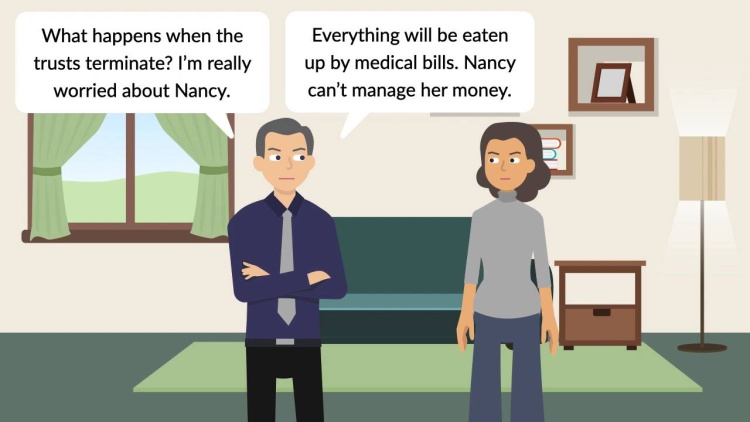In re Riddell
Washington Court of Appeals
157 P.3d 888 (2007)

- Written by Christine Raino, JD
Facts
George and Irene Riddell, parents of Ralph Riddell (plaintiff), created trusts leaving the residue of their estates and life-insurance proceeds in trust for the benefit of Ralph and his family. Each of the trusts provided that after Ralph and his wife, Beverly, had died, the trust income would be paid to Ralph and Beverly’s two children, Donald and Nancy, until they reached the age of 35, at which point the trusts would terminate and Donald and Nancy would receive the trust assets. After the creation of these trusts, Nancy entered Western State Hospital for treatment of schizophrenia affective disorder and bipolar disorder, and she was not expected to be able to live independently for the remainder of her life. Since Nancy relied on public financial assistance to pay for her care, distribution of the trust assets to her after her parents’ death would likely be seized by the state to repay her medical costs. To protect the trust assets, Ralph filed a motion with the court to consolidate the trusts and modify the terms to create a special-needs trust for Nancy. Ralph argued that George and Irene intended for the trust to terminate when Donald and Nancy were 35 years old to ensure they received the assets when they were competent to handle their own financial affairs and they were unaware of Nancy’s condition. The trial court consolidated the trusts but denied Ralph’s motion to establish a special-needs trust. The trial court found that the stated purpose of the trust was to provide for the support, maintenance, education, and medical care of the beneficiaries and held that a special-needs trust, by limiting the availability of funds that could be expended for medical care, did not further the trust purpose as required under the Third Restatement. Ralph appealed.
Rule of Law
Issue
Holding and Reasoning (Penoyar, J.)
What to do next…
Here's why 907,000 law students have relied on our case briefs:
- Written by law professors and practitioners, not other law students. 47,100 briefs, keyed to 996 casebooks. Top-notch customer support.
- The right amount of information, includes the facts, issues, rule of law, holding and reasoning, and any concurrences and dissents.
- Access in your classes, works on your mobile and tablet. Massive library of related video lessons and high quality multiple-choice questions.
- Easy to use, uniform format for every case brief. Written in plain English, not in legalese. Our briefs summarize and simplify; they don’t just repeat the court’s language.





